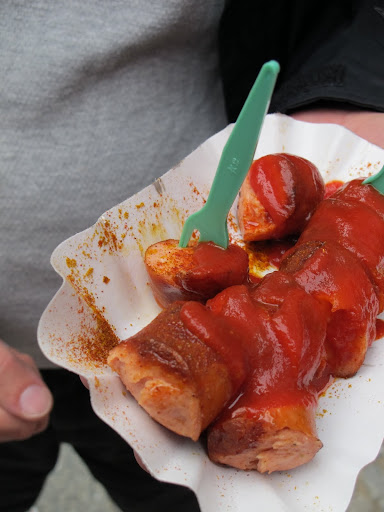Eat Smart in Germany
Coming from a heritage that is partly German, I was definitely intrigued when I discovered a new book from one of my favorite book series: Eat Smart in Germany. You might remember our previous Eat Smart interviews, Eat Smart in Sicily and Eat Smart in France - have you been cooking from them, like I have? What I love about these Eat Smart Guides (published by Ginkgo Press) is that they combine culture, history, travel, recipes, language, and more. Eat Smart in Germany follows along that path, very nicely.

Eat Smart in Germany focuses on the history and development of German cuisine, a regional tour of German foods, recipes, shopping tips, resources, a language guide, a menu guide (definitely pore over this before heading to Germany!), a restaurant reference guide, and a glossary of the German kitchen - foods and flavors. The recipe section includes a beverage, appetizers, salads, soups, main dishes, side dishes, sauces, and, of course, desserts! This book is an inspiration to travel to Germany - and also bring Germany home, to your kitchen. If you've been to Germany, you'll cherish this book for sharing recipes of foods you loved. If you've not been to Germany yet, well, you will be soon - this book is that inspiring, especially for foodies like myself. I love the photos, the insight into German culture, and, of course, all of the deliciousness.
We had a chance to catch up with author Mary Bergin (who also shares her global expertise on her websites Roads Traveled and Travel2Connect), to find out more about the book, recipes, eating, and the joy of researching! Here's what she had to say...

Mary Bergin
Please tell us about your book, Eat Smart in Germany...
My newest book, Eat Smart in Germany, is the 12th installment of the Eat Smart culinary guidebook series, established about 20 years ago to help travelers who want to eat authentically when in a foreign country.
Food glossaries and chapters about the country’s culinary history and regional specialties make it easier to know what to look for at markets and restaurants. Armchair travelers are able to prepare authentic German foods at home because each Eat Smart guide contains a recipe section. More details are at www.eatsmartguides.com.
What is your background in Germany and German food?
I am a longtime food and travel writer whose first trip to Germany was taken in 2007, before I was offered the opportunity to write Eat Smart in Germany. It was a press trip to Bavaria, I took extensive notes and – because I’m wired the way I am – that meant paying particular attention to the food.
The recipes in this book are fantastic - how was it, doing research for this book?
After signing a contract to write Eat Smart in Germany, I visited the country again (in 2010) to better understand the foods of Berlin, Dresden, Leipzig, the Black Forest area, and Hessen (Wisconsin’s sister state).
In early 2011, I made one more trip to Germany and got acquainted with the northern end – Hamburg, Kiel, Lubeck.
I think book publisher Joan Peterson, who wrote the first 10 Eat Smart guides, offered the Germany book project to me because of my previous work as a food and travel writer. I began a weekly and syndicated newspaper travel column in 2002. My previous books include Hungry for Wisconsin, a food book published in 2008.
My lifelong newspaper background, which includes 20 years as an editor and writer at The Capital Times in Madison, also works to my advantage. I know how to research a topic, sniff out the unusual and present it in a manner that interests average people. I don’t speak German, but that was not a problem because my editor was an excellent German scholar and I also had access to a good translator.
The recipe testing process was fun and frustrating, depending upon the recipe. After translating, some were too complicated. Others were time-consuming but well worth it, and some were quick and tasty. We have a good range of recipes in the book.
Lubeck Niederegger Museum
How did you persuade the chefs to share their recipes?
Many chefs chose to not share recipes during my travels to Germany, but others were very helpful. It’s that way in the United States, too.
What are your favorites?
The trout tartare appetizer is like a ceviche – a tasty, light choice that is good for summer dining. Unusual, too!
It’s a heavier meal, but I love the marinated pot roast entrée – I had never marinated meat so long, but the gravy that was the result of it was absolutely fabulous.
Simple and unusual is the currywurst sauce, which cooks could serve on the side during their next barbecue.
What things are surprising to you, while eating and researching in Germany?
It’s all good, and the things that most impressed me during my research were the regional pride and nuances that are a part of the German cuisine. People are frugal and smart in the kitchen but don’t skimp on ingredients that most make a difference in quality.
We Midwesterners think we know “real” German food, but what we know is our families’ Americanized interpretations of it. That’s fine, but I think Eat Smart in Germany enriches the dialogue about what is authentic. The cuisine is not as simple as it first appears.

Currywurst
And a recipe, permission granted from the author:
Grüne Soße
Green Sauce - serves 4
Owner Juan-Enrique Weinhold of the Cooking Ape provides cutting edge catering in Frankfurt but also embraces local foods and regional heritage. Such is the case with this thick, herbal sauce that Frankfurters love to serve with boiled potatoes and boiled eggs. "Never put onions or garlic in it," the chef advises.
The German writer Goethe (1749-1832) loved Grüne Soße with boiled potatoes, mentioned it in his books, and helped the sauce become known around the world.
Ingredients:
2 cups fresh herbs (a mix of chervil, pimpernel, sorrel, borage, parsley, chives, and watercress)*
4 t oil
3 t vinegar or lime juice
1 t mustard (not too hot)
1 c sour cream
salt and pepper, to taste
5 hard-boiled eggs
Directions:
Chop the fresh herbs. Mix with remaining ingredients, except eggs. Slice eggs in half and remove yolks. Mash yolks and add to herb mixture. Dice egg whites and add to mixture. Chill at least 2 hours.
Tip: stretch the recipe by using more sour cream or yogurt, but the sauce should be neither runny nor stiff.
* Pimpernel is also known as salad burnet. Some cooks diversify by adding dill, tarragon, lovage, lemon balm, and/or spinach.
Note: We received a review copy of Eat Smart in Germany from the publisher - thank you!





















